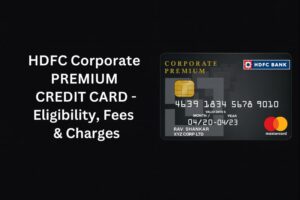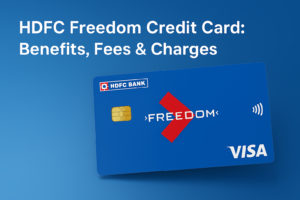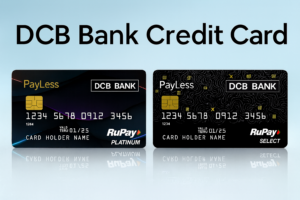How to Use a Business Credit Card Effectively in 2025: Tips for Indian Businesses
- 28 Oct 25
- 9 mins
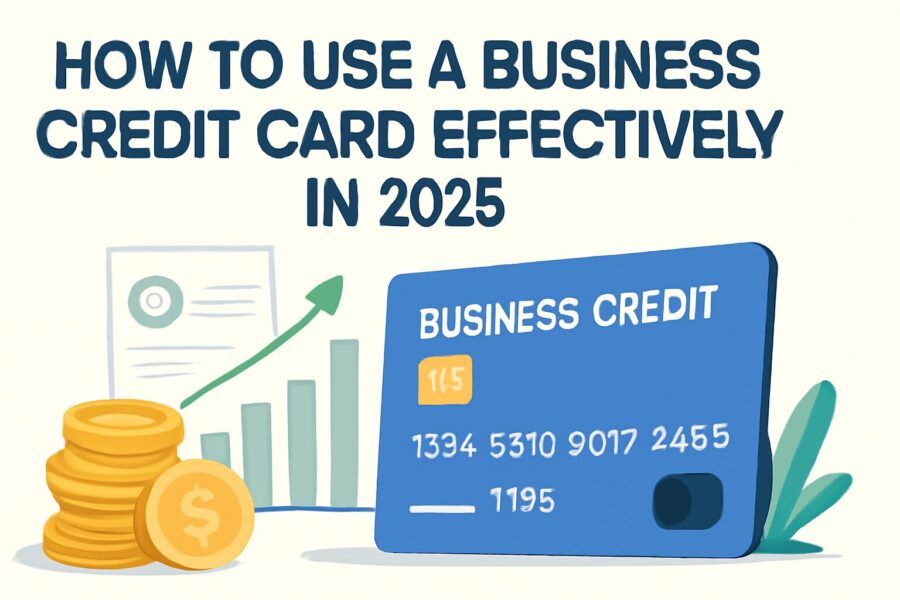
How to Use a Business Credit Card Effectively in 2025: Tips for Indian Businesses
- How Does a Business Credit Card Work?
- How to Use a Business Credit Card Responsibly?
- Qualification Criteria for a Business Credit Card
- Payments and Interest on Business Credit Cards
- Cash Withdrawal on Business Credit Card
- Pros of Business Credit Cards
- Cons of Business Credit Cards
- 6 Ways to Maximise Your Business Credit Card Benefits
- Conclusion
Key Takeaways
- Knowing how to use a business credit card helps you manage company expenses, maintain accurate financial records, and take advantage of interest-free periods by paying your bills in full each month.
- Use accounting or expense-tracking software to monitor spending and stay within your credit limit. Responsible usage improves credit health and simplifies tax preparation.
- When issuing employee cards, define spending limits and policies to ensure responsible use and prevent unauthorised transactions.
- Timely payments and maintaining a credit utilisation ratio below 30% help boost your business and personal credit scores, while avoiding late fees and high interest charges.
- Select a card that aligns with your company’s spending habits, whether for travel, fuel, or online purchases, to maximise rewards, cashback, and other benefits.
Are you looking to manage your business expenses smarter while enjoying perks like interest-free periods and rewards? Understanding how to use a business credit card can help you optimise spending, streamline bookkeeping, and maintain financial discipline. Unlike personal cards, business credit cards come with unique rules for interest, cash withdrawals, and employee usage.
If you are a business owner planning to apply for one, learning the right strategies ensures you maximise benefits, protect your credit score, and keep your business finances organised.
How Does a Business Credit Card Work?
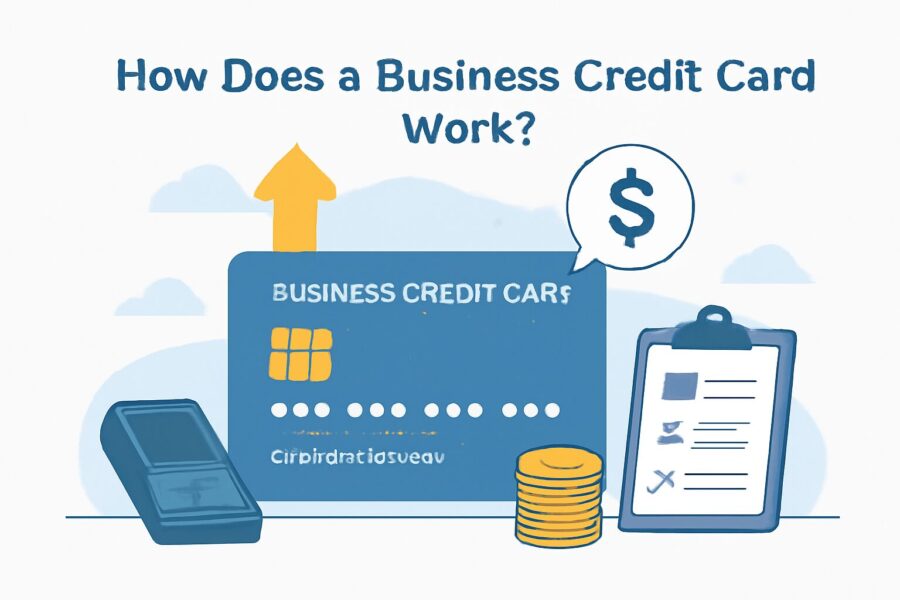
A business credit card functions like a personal credit card; however, it is intended for business expenses. It allows you to buy items, pay suppliers, or incur other costs of running a business, up to a pre-approved limit. At the end of each month, you will receive a statement from the credit card company. If you pay the full bill prior to the due date, no interest will be charged.
For example, if a small business in Mumbai purchases office supplies for ₹50,000 using a business credit card, they will maintain clear and accurate records of the purchase, and they avoid incurring interest by paying the balance in full within 30 days.
How to Use a Business Credit Card Responsibly?
Maintain Accountability
To use your business credit card responsibly, ensure you keep an expense management and tracking tool. Such a tool or software can help you know the amount spent, the categories of spending and the remaining credit card limit. You can further manage tax preparation, business finances and bookkeeping with this accounting software.
Provide Employee Usage Policies
If you provide your employees with corporate credit cards (employee cards), ensure you set a usage policy and spending limit. This will help you prevent unauthorised and non-compliant usage of employee credit cards. Additionally, you can track your business expenses on employee credit cards seamlessly for financial discipline.
Ensure Low Credit Utilisation Ratio
A high credit utilisation ratio might indicate you as a high-risk borrower. This might affect your credit score adversely while reducing future borrowing opportunities. Ensure you maintain a 30% (approximately) credit utilisation rate on your credit limit.
Make Timely Payments
One-time payments for business credit card bills are important in India to avoid incurring interest payments, late payments, and impact both your business and personal credit scores, in addition to maintaining good credit history. You can set reminders or set up an auto-pay function to stay on track.
Separate Personal and Business Expenses
If you mixed personal cards and one-cards for business, it can potentially create confusion for the purposes of filing your GST, tax deductions, and financial audits. Having separate accounts and cards for your business will be cleaner to manage for financial records, easier on your accounting, and will make tax compliance more efficient with transparency regarding your financial records of business recognition of expenses in accordance with Indian tax regulations regarding businesses.
Choose Cards That Suit Your Business Needs
When choosing a business credit card, consider the nature of your company's spending habits. Some cards offer better benefits for specific expenses, such as travel, fuel, and online purchases, compared to general convenience. When you choose a business credit card based on your spending habits, you can choose a business credit card that maximises your benefits, cash back, and overall efficiency of managing business expenses.
Qualification Criteria for a Business Credit Card

Lenders usually consider the personal credit score of a business owner to issue a business credit card. As a business owner, if you have at least a credit score of 750, you can be eligible for a business credit card.
Moreover, lenders consider the business's revenue, the amount of money the business has in the bank, and the number of years of operation. You can qualify for a business credit card if you have additional credit lines and vendor financing to build your credit.
Notably, the qualification criteria might vary based on the lender. Besides the above-mentioned criteria, lenders might ask for the following documents:
- Tax returns and income proof
- Business license
- Bank statements
- Financial projections
- Identify and address proof (PAN card, Aadhaar, voter’s ID, driving license, passport)
Payments and Interest on Business Credit Cards
Business credit cards generate a monthly statement, similar to personal credit cards. You need to pay the entire bill amount within the bill due date to avoid attracting interest charges.
In case you are unable to pay the entire amount, ensure you pay the minimum amount due to reduce the interest amount. Usually, business credit cards come with an interest-free period of up to 55 days (variable as per the lender). Besides interest, banks often charge a 2–3% cash advance fee.
Ensure you pay your credit card bill amount within the grace period to avoid interest charges. You can set automatic payment reminders to pay your bills within the due date.
💡Pay your credit card bills in an easy and secured way with the PICE App.
Cash Withdrawal on Business Credit Card
Business credit cards allow you to withdraw cash within the cash advance limit, similar to personal credit cards. Repeated cash withdrawals can increase your credit utilisation ratio, affecting CIBIL/business credit scores.
However, it might attract a cash advance fee and an interest rate that is significantly high. As an alternative, you can consider applying for business loans or other credit lines for cash. This can help you avoid high interest rates on credit card cash advances.
Pros of Business Credit Cards
- Business credit cards promote financial planning with immediate cash flow.
- You can earn rewards (rewards programs) and cash back on business expenses to reduce your expenditure.
- It allows you to build a good credit score, developing future loan opportunities at competitive rates.
- You can track your business expenses for tax filing and bookkeeping.
- Built-in fraud protection facilities on several cards prevent unauthorised transactions.
Cons of Business Credit Cards
- You might have to pay an annual fee to use your business credit card.
- Unpaid bills might attract late fees and high interest rates, increasing your cost.
- You might tend to overspend with the available credit limit.
- Mismanagement of business credit cards might affect your credit score.
6 Ways to Maximise Your Business Credit Card Benefits

1. Avoid Mixing Personal and Business Credit
To maximise benefits on your business credit card, ensure you avoid mixing personal and business expenses. Even though spending on a business credit card for personal expenses and the reverse are allowed, it results in complex tax filing.
You can use your personal credit card for personal expenses and a business credit card for business-related expenses to segregate and optimise tax filing.
2. Pay Your Bill on Time
If you do not pay the entire bill amount for a billing cycle within the bill due date, it will attract interest. This will not only increase your credit card debt but also affect your business’s financial stability significantly.
Ensure you pay the entire bill amount within the due date to maximise the benefits of the interest-free period.
3. Check Introductory Offers
Before you apply for a business credit card, ensure you check the introductory offers (if applicable). Several card issuers often provide a 0% interest rate or additional rewards as introductory offers.
If you make purchases within the offer period, you can save on your credit card bill. Notably, if you do not pay your bill within the introductory period (in case of 0% interest offer), high interest rates might apply.
4. Optimise Your Spends for Rewards and Cash Back
Several credit cards offer cash back and rewards on specific categories such as travel and dining. You can apply for a business credit card that offers such benefits to help you save on your expenses. Ensure you check the rewards and cash-back facilities before applying for a card.
5. Use Virtual Cards
If you are concerned about fraud protection and security, consider using virtual business credit cards. You can lock or delete this card to safeguard against scams.
6. Optimise Usage to Maintain a Good Credit Score
Using a business credit card not only affects your business credit score but also your personal credit score. Ensure you use your business credit card efficiently by maintaining a low credit utilisation ratio and paying bills on time to maintain a good personal credit score and credit history.
Conclusion
Now that you know how to use a business credit card, ensure you maximise the benefits with responsible use of your card. Ensure you pay your credit card bill within the due date to avoid paying additional interest and late fees.
Tracking your credit card expenses at regular intervals can further help you avoid overspending. This will additionally help you maintain a low credit utilisation ratio and a good credit score.
 By
By 








